What is Keyword Research?
You need a laser-focused sniper approach, and this is where keyword research and analysis come in. We’ve all heard and seen how important UI/UX, website design interface, and page loading speed are, but equally vital is the keyword-researched content that makes up your website.
Your website is your online presence and an indirect salesman of your business. With Google’s ever-changing algorithmic updates, if there is one thing that content marketers and website owners need to focus on, it would be keyword research.
This means you should cater to the needs of people who search online and build your website’s semantic core. These needs (read keywords) keep changing from time to time. If you don’t update your website, you’ll soon find yourself out of competition.
This guide will help you better understand keyword research tools, build a semantic core, explain why it is significant for search engine optimization, and explain the tools used in attaining highly targeted organic traffic.
The Significance of Keyword Research – Building a Semantic Core
The name of a chemical from your chemistry lab seems confusing. Nope! The semantic core is the practice of using all sorts of relevant keywords throughout your website so that it has the best possible chance of getting targeted organic traffic. And these keywords aren’t just based on intuition, but researched and divided into various categories, such as:
- High frequency – Search Engine Optimization
- Medium Frequency – Search Engine Optimization Company
- Low Frequency – Search Engine Optimization Company in Denver, Colorado
- Short tail – SEO Company
- Long tail – SEO Company Services in Denver, Colorado
The keywords on high frequency are not only the most popular ones, but also the most competitive. It is not impossible, but extremely difficult to rank for a term as generic as “Search Engine Optimization.”
The medium-frequency keywords are slightly more targeted for your audience and serve a purpose. While the keyword “Search Engine Optimization” serves no purpose, “Search Engine Optimization Services” does! And it may not be as competitive as the generic keyword.
When talking about low frequency, which does NOT mean low-searched, these keywords are highly relevant to your audience and are often long-tailored (more on that in this guide). In using keywords, it is essential to consider that while you are doing this all to rank organically, your eventual goal will be to optimize helpful content for people to take action on your website. And these actions could be in the form of leads, queries, and/or sales.
Here is a screenshot recently taken for a “real estate” agent search:
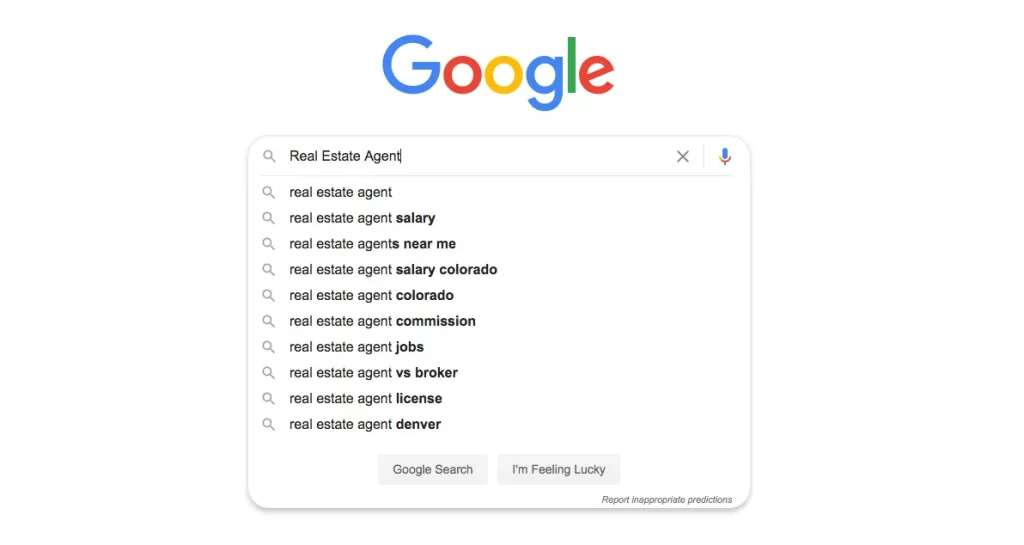
Notice the keywords suggested below the “Real Estate Agent” search phrase? They all form a part of the semantic core. It is now up to you to see how well you incorporate these keywords into meaningful and helpful content for your audience.
You need to decide on your current audience. Are you a real estate agent? Do you provide training services? Do you have a blog on real estate agent jobs, salaries, and current news in the industry? Decide for yourself and see what keywords you can target!
Finding the Right Keywords
Since we are based in Denver, Colorado, our first target is customers near us. It is possible (but not likely) that someone in California is searching for an SEO company in Denver, Colorado.
Hence, we need to target primarily the people searching for an SEO company based in Denver.
Tools to Conduct Keyword Research
There are ample tools for finding the right keywords for your website, and while several of them are paid, many are free. We are giving a short review of both for you.
Google Ads Keyword Planner
Make Google Ads’ keyword planner tool your best friend! In fact, it is the first-stop keyword research tool for anyone starting an SEO campaign. It is and will always remain (hopefully) free!
Signing up and using a Google Ads account for keyword research is free. Head over to ads.google.com (Formerly known as Google Adwords) and click Start now if you don’t have a Gmail account or Sign In if you have one:
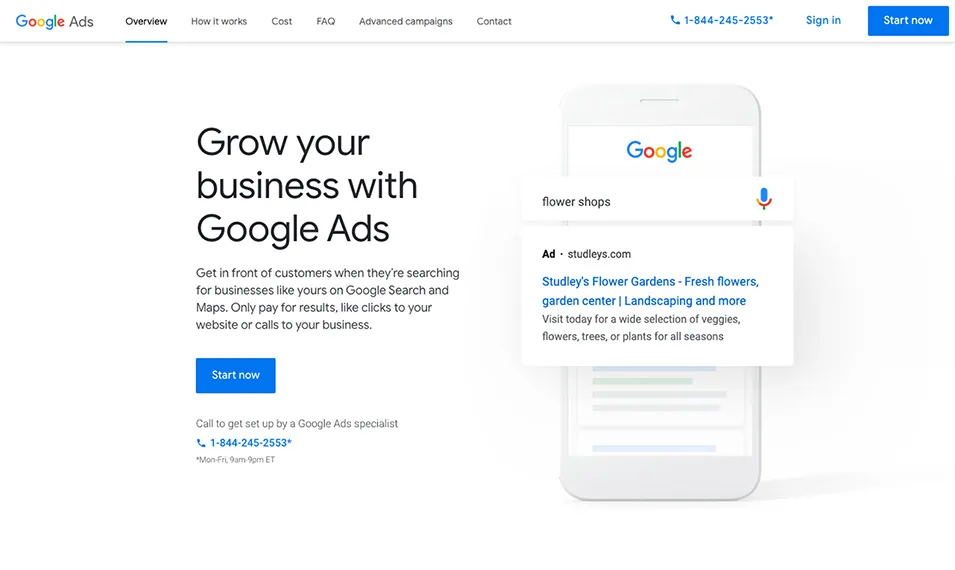
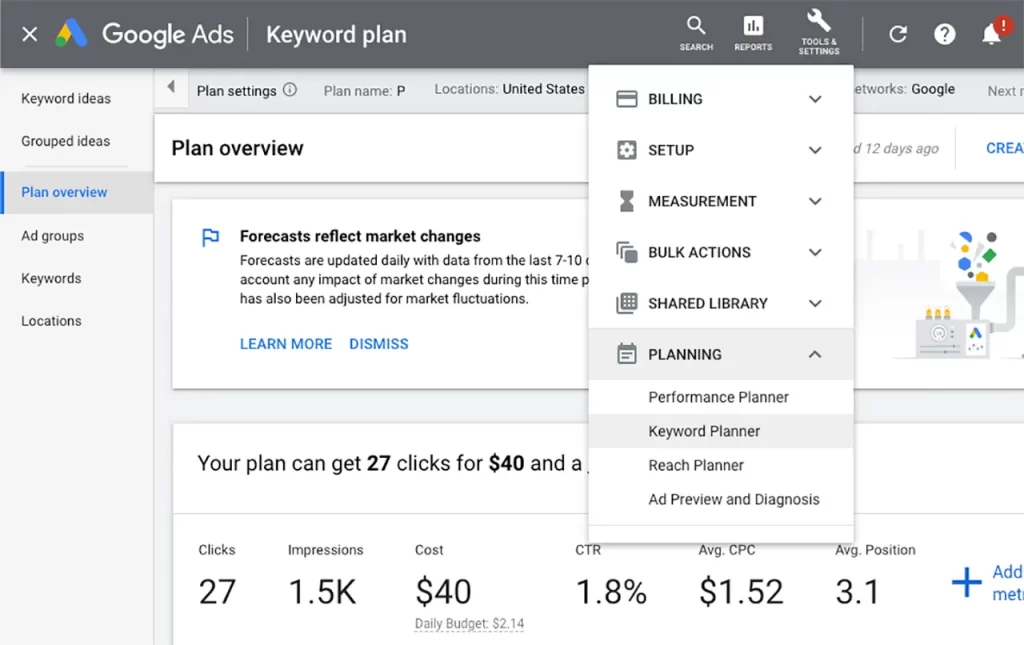
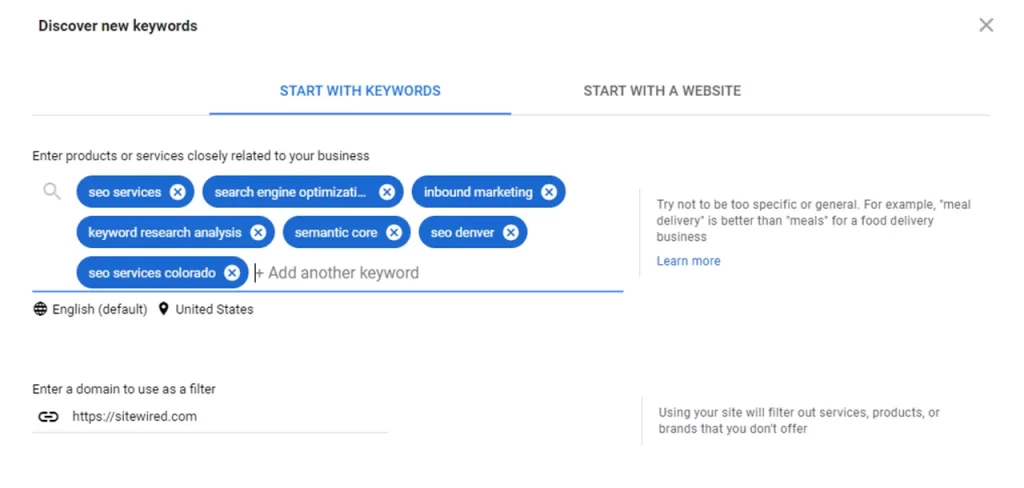
Here are the same results in the Google Sheets file. You will see the competition, searches, and average. CPC for each keyword. This is a great way to develop new keyword ideas related to your business. From an SEO point of view, we are talking about implementing these keywords for an SEO agency, in this case, Sitewired.com. For this purpose, we will have to determine which keywords add value and which don’t. Some keywords with high search volume mean we create a separate blog post/page to rank for those. Ultimately, it all depends on how you want to rank for each term. Writing content and optimizing for all the relevant keywords is the entire idea of building sa emantic core:
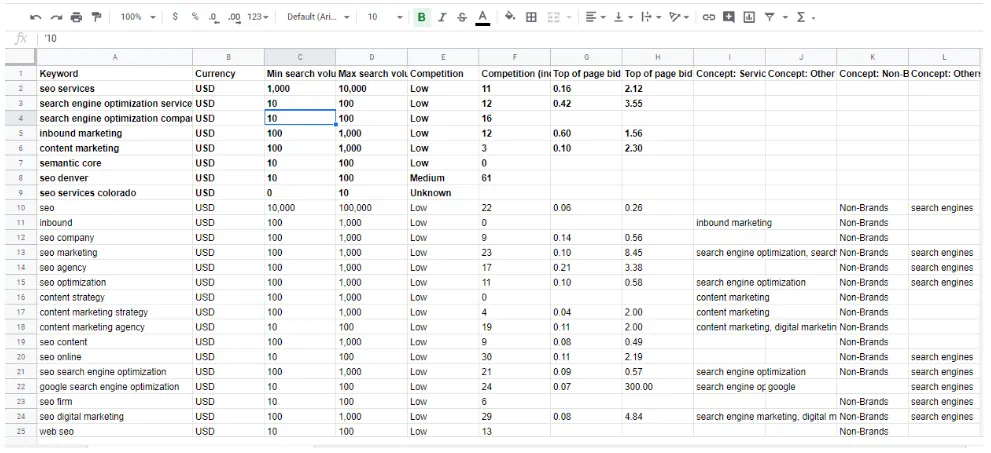
Let’s sum it up now. Since our business is focused on providing SEO and digital media marketing services, we need to target an audience interested in these services.
Since we also offer website designing services, here is what our semantic core can look like:
- SEO
- Keyword research
- SEO Audit
- SEO Content Writing
- SEO Research and Analysis
- Website Design
- Website Design Colorado
- UI/UX Design Services
- Responsive website design
- Website maintenance and support
You get the idea. This is how you categorize keywords based on their relevance to your business and optimize your online store or website to ensure maximum targeted organic traffic.
Google Search for Related Keywords
Many people skip this step and only rely on the keywords from the Keyword planner tool. But if you pay close attention to it, you will find many related searches previously ignored by your SEO campaign.
For this example, we have searched for “Website Design Services.” While the search results will vary based on your location, if you scroll to the bottom, you will find related searches that people conduct.
These suggestions are actual keywords and can be very handy to utilize as related keywords (LSI keywords). Here, have a look:

Try This Pro Tip:
Put in these keywords in Google to find MORE related keywords and you have a bucket of highly targeted search terms to include in your campaigns.
Ahrefs and Ubersuggest
While Google Ads Keyword Planner is the first stop in finding the right keywords, Ahrefs is an extremely valuable but paid tool. You can use it for analyzing backlinks, competitor research, keyword research, and more.
This is an advanced tool as you can use it to spy on your competitors literally, understand their traffic sources, and know what keywords they are ranking for. Here is how the interface looks:
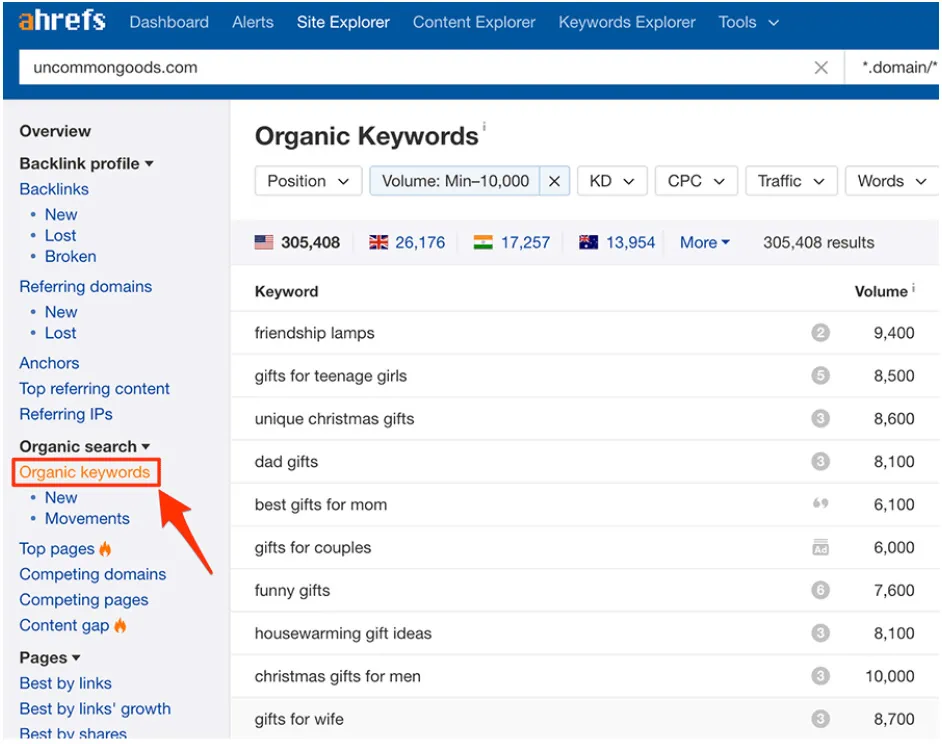
This is an example website that shows the keywords it is ranked for, the search volume and keyword ranking according to various countries. This data is worth its weight in gold and can provide enough data for several months of your SEO campaign.
Ubersuggest
Owned by Neil Patel, it is one of the most cost-effective and economically priced keyword and competitor research solutions in the market. Starting at just $12 for tracking up to 3 websites, you can easily perform SEO tasks and track the progress and results. The free version is limited in providing data and access, but should be good enough for a start. We will be taking an example of Sitewired in this case. After running a test on the homepage, here are the results:
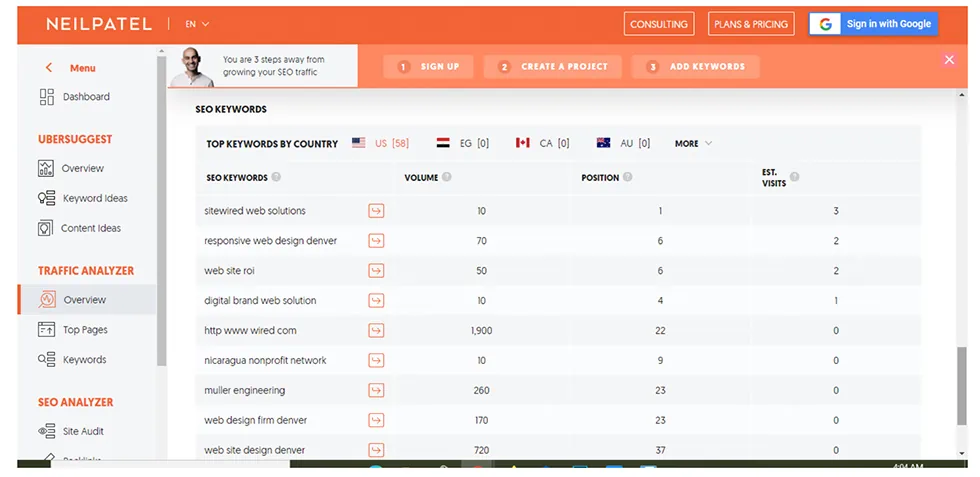
You can see the number of keywords, the position, and the volume. These vary daily depending on your search traffic and how aggressive your SEO campaign is. Using Ubersuggest, you can easily identify targeted keywords and perform competitor research. As such, you can implement a solid SEO plan backed with data.
Intent and Impact of Keywords
When starting an SEO campaign, it is important to find the right keywords, but even more vital is to research the intent and the possible impact. For example, a web hosting company promoting managed VPS hosting plans should not optimize its content for “Free managed hosting” or “free WordPress hosting.” Why? Someone looking for “free” would have minimal chances of converting to a paying customer.
The following screenshot shows how Google has shown results related to the “free managed WordPress hosting.” This is a great way to identify the user’s intent. Since the search results show pricing points, the hosting company needs to drop the word “free” from their SEO campaigns:
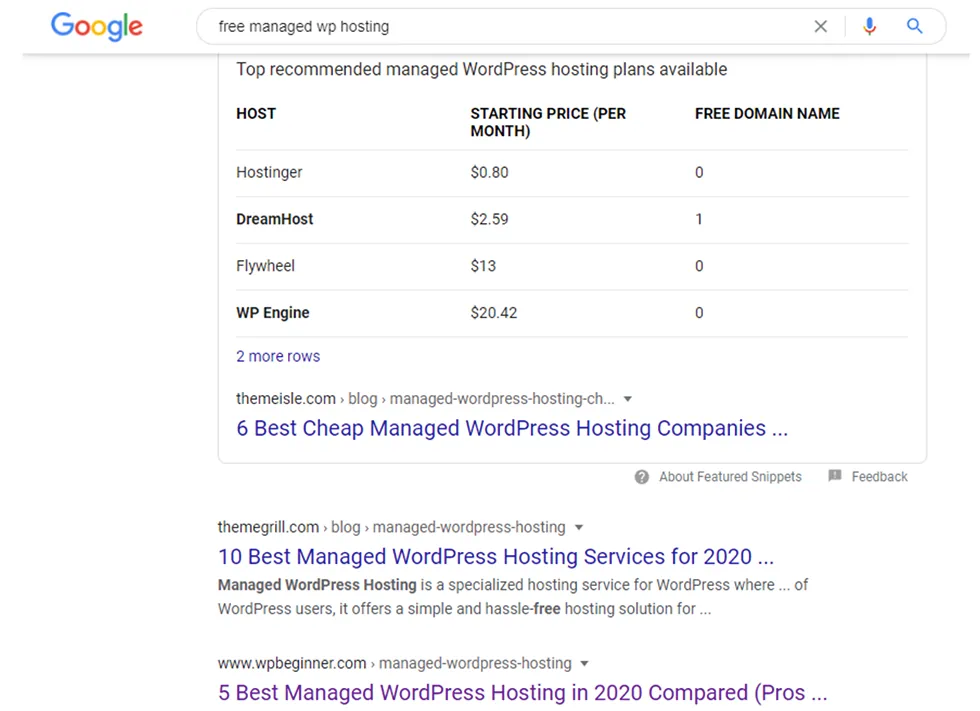
The intent behind “free” is not convincing enough to include this keyword in the SEO campaign.
When conducting keyword research, ask yourself the following questions:
- Why am I conducting this research?
- What is the intention behind these searches?
- How would ranking for these keywords affect my website traffic and conversions?
Optimizing for keywords not relevant to your business will lead to a higher bounce rate, which isn’t a viable option.
According to MOZ, SEOs should not forget the importance and relevance of long-tail keywords.
Here’s a graph to explain:
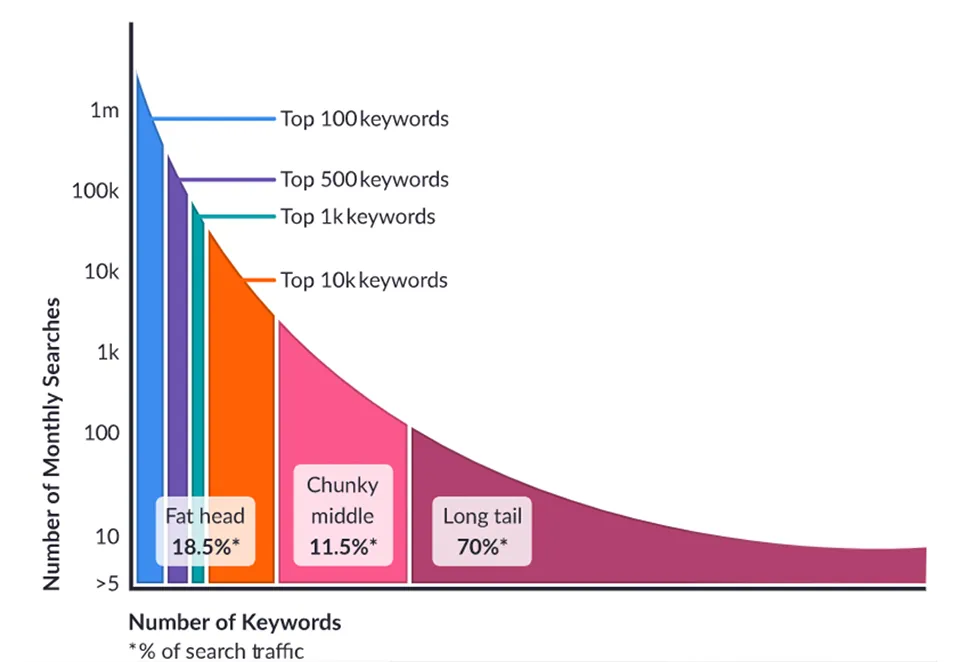
Long-tail keywords aren’t just targeted for your business, but they also include questions and conversational phrases that customers usually search online. For example:
- How to make a responsive website?
- How to do keyword research?
- What is SEO Keyword research?
As mentioned earlier, one of the BEST ways to find out conversational phrases is by typing some questions on Google Search and getting a list of recommended questions, like this:
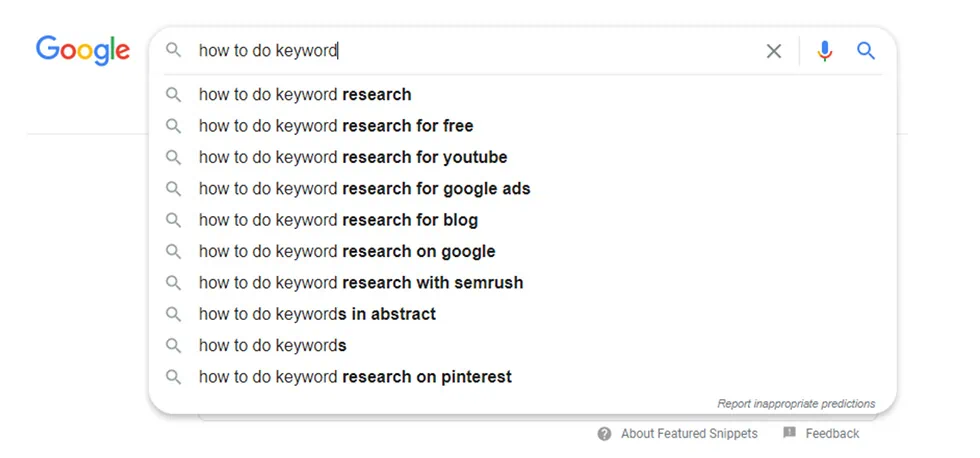
If you were to write and optimize for how to do keyword research, your chances of appearing at the top would be lower than if you were to do the same for YouTube, Google Ads, or Bing, etc. It all boils down to competition. Everyone is doing keyword research, but when you pick up a long-tail keyword, your chances of ranking automatically increase.
Wrapping It Up!
There is no shortcut or magical formula for search engine rankings, and SEO is not a programming language where you can instruct Google to bless you with free organic traffic.
Gaining fruitful results from an SEO campaign is getting harder every day due to the ever-changing algorithmic nature of the big G. With that being said, this time-consuming effort is worth the time. And in case you were thinking, here is the answer:
No, SEO Isn’t Dead!
If you don’t have a solid SEO plan with a semantic core as the foundation, you are bound to fail online. Building a semantic core should be the first part of your SEO campaign, as it can’t be ignored anymore. Without one, you won’t receive enough traffic and conversions.
Many SEOs also fail to realize that optimizing for keywords isn’t enough. Writing great, meaningful content rich with keywords is equally important. This could be in the form of blog posts, new articles, guest posts (with a link back to your website), or improving your website copy.
SEO is an evolving field. What works today may not work tomorrow. Who knew in December 2019 that there would be a sudden shift toward remote working due to COVID-19? We now have a slew of keywords and search terms related to Coronavirus.
Remember to reevaluate your keywords every few weeks. You never know when new search terms will pop up!
Over to you now! We would love to hear your response to this guide. Please share your experiences with us and let’s get something mutually beneficial out of it 🙂

